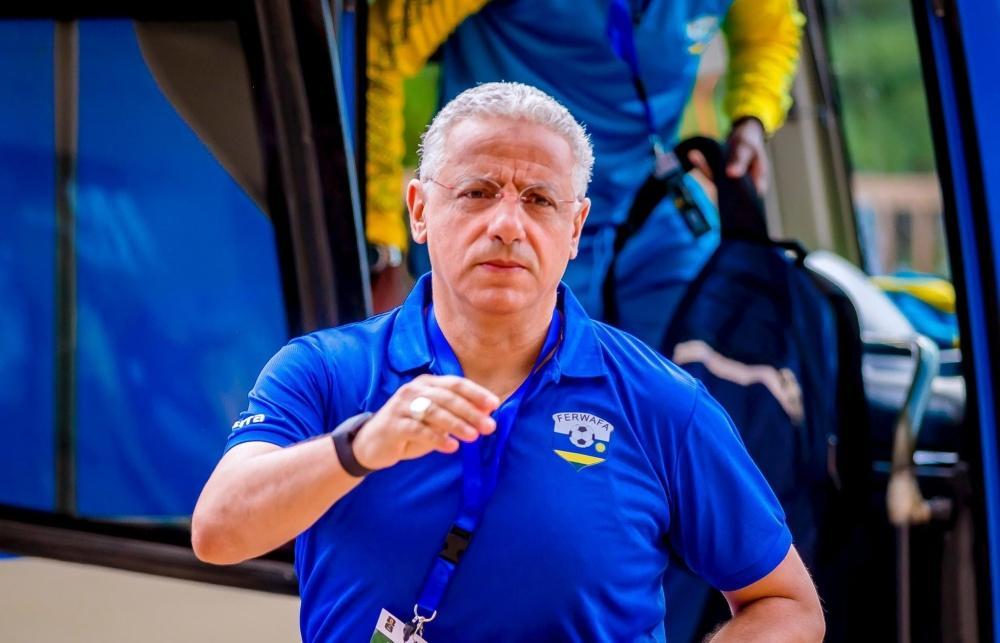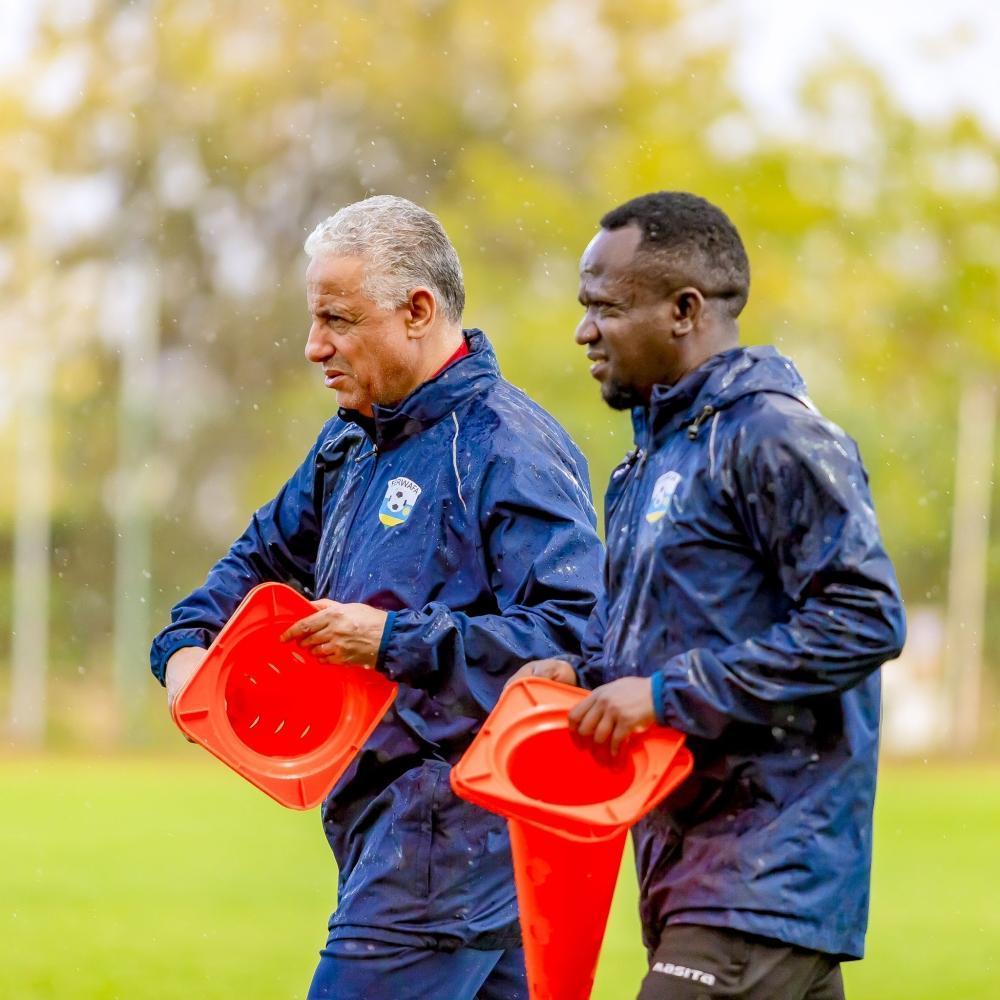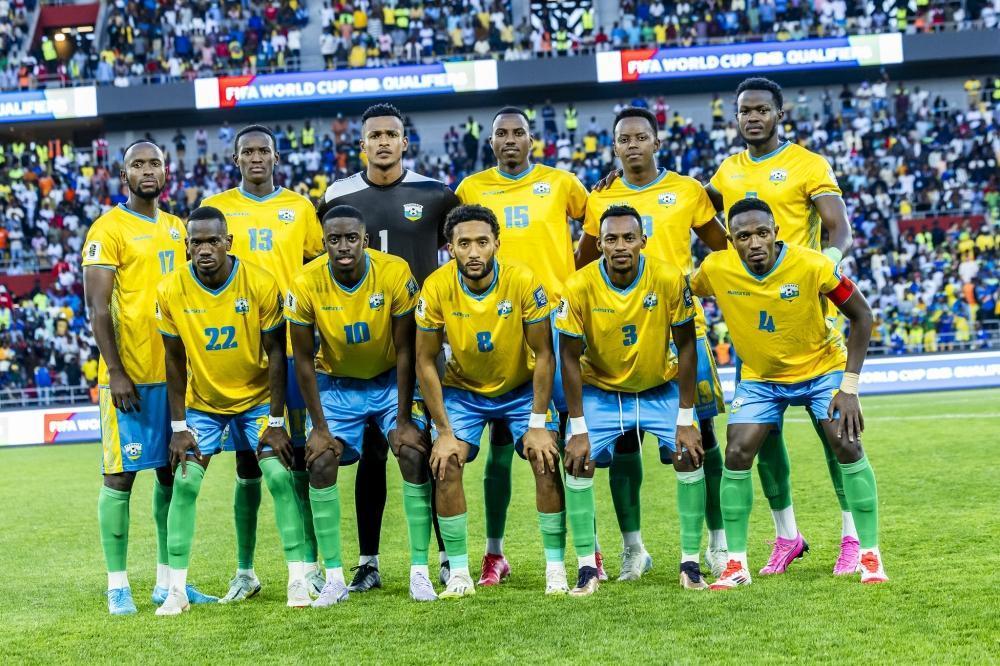Africa-Press – Rwanda. Rwanda national football team has been under the spotlight recently, with their performances in the 2026 World Cup qualifiers raising concerns among fans and officials alike.
The team’s new head coach, Adel Amrouche, is the obvious focal point of discussions after his first two matches in charge, which ended in a demoralizing 2-0 defeat to Nigeria and a frustrating 1-1 draw with Lesotho, both at Amahoro Stadium.
In the aftermath of these disappointing results, Amrouche made a candid admission that has since stirred up conversation: he was “ashamed” of his team’s performance against Nigeria. But what does this statement truly mean for Rwanda’s future and Amrouche’s tenure?
A rocky start for Amrouche:
Amrouche’s debut match as Rwanda’s head coach couldn’t have been more difficult. A loss to Nigeria, compounded by the clinical performance of Victor Osimhen, was not just a defeat but a humbling experience.
The Amavubi showed little resistance against the Super Eagles, and despite Amrouche’s claims that his team would put up a fight, the match ended with little to offer in terms of attacking or defensive solidity.
It wasn’t just the scoreline that disappointed fans but the overall lack of fight and organisation that was expected under a new coach, moreover in his debut match.
Amrouche’s post-match comments were telling:“I am very ashamed today. We can’t give such performance like this in front of all these fans and the president,” he admitted.
His statement was an acknowledgement that his team had failed to meet expectations on a national stage.
While his honesty in admitting the team’s shortcomings was a refreshing change, it raised questions about whether Amrouche could inspire the turnaround that Rwanda desperately needs.
If the first match was a poor start, the second—against Lesotho—did little to restore confidence.
Lesotho draw: A missed opportunity
Assistant coach Eric Nshimiyimana said it was “not the result we wanted”. And that is not exactly the kind of answer fans want to hear, for they have heard it more than enough.
In their second match under Amrouche, Rwanda took the lead against Lesotho through Jojea Kwizera, but the team allowed the visitors to nip an equalizer in the 82nd minute through substitute Lehlohonolo Fothoane.
The outcome was another letdown for the Amavubi, who had been hoping to bounce back with a victory after the disappointment of the Nigeria match.
Lesotho’s head coach Leslie Notsi spoke candidly about Rwanda’s missed opportunities, “criticizing” the Amavubi for wasting several chances throughout the match.
While it can be argued that Lesotho’s tactical discipline played a role in stifling Rwanda’s attack, the fact remains that the home side failed to capitalize on their superiority.
Amrouche, however, remains undeterred, stating that his team needs to regroup and correct their mistakes. Yet, the draw at home against a side like Lesotho, deepens the sense of disappointment.
Impatience from Rwanda FA
As Amrouche faces early pressure from both fans and the media, the question arises: Can he be trusted to last the two years of his contract?
It’s early days, but Rwanda’s football authorities are known for their impatience when it comes to underperforming national teams.
The recent history of coaching changes—sometimes after just a handful of matches—suggests that Amrouche’s position may be under scrutiny if the results do not improve, and quickly.
It’s not just about results but also the style of play. Amrouche has promised an attacking, vibrant footballing approach, yet his team has struggled to show any real offensive threat.
Against Nigeria, the Amavubi were completely outclassed, and while there were moments of promise against Lesotho, the failure to secure three points against a team of their calibre raises serious doubts.
Elsewhere in the same grouo, Nigeria were held to a late 1-1 draw at home by Zimbabwe, while South Africa strengthened their grip on top spot with a convincing 2-0 away victory over Benin.
The win takes Bafana Bafana to 13 points, five clear of second-placed Rwanda and Benin, who are third on goal difference while Nigeria are a point further behind in fourth position ahead of the next round of qualifiers in September.
What’s next for Rwanda?
Looking ahead to the next round of matches in September, Rwanda will need to drastically improve their performances if they are to remain competitive in these qualifiers, and beyond.
Amrouche must instill a sense of urgency and discipline in his team, particularly in the final third. The Amavubi have shown flashes of quality but have consistently failed to maintain focus or capitalize on key moments.
Fact is, the 56-year-old Algerian needs to find a solution to his team’s inconsistency if he is to stay at the helm for the duration of his contract.
Rwanda’s chances of qualification for the 2026 World Cup are already slim, and with each passing match, the pressure to deliver results mounts.
Can Amrouche survive?
Ultimately, the question remains whether Amrouche can last the full two years of his contract.
The Rwandan FA will be monitoring his progress closely, and the upcoming fixtures away to South Africa and Nigeria, and at home to Zimbabwe, will be crucial.
If Amrouche is unable to turn the team’s fortunes around, he may well find himself out of a job sooner rather than later.
The next few months will be critical, and while his candid reflections after the matches show a level of self-awareness, they must be followed by tangible improvements on the pitch.
Another truth is, while Rwanda’s footballing future may not be bleak, it is certainly uncertain.
For now, Amrouche’s tenure looks secure as he gets his feet under the table but results too need to come quickly and the team rediscovers its identity and competitive edge, or else……
For More News And Analysis About Rwanda Follow Africa-Press








